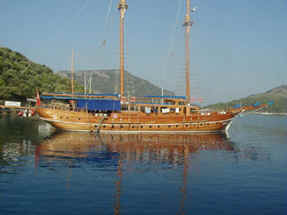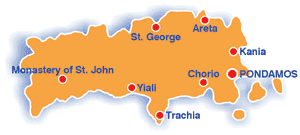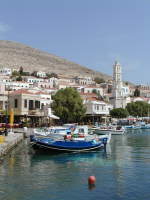 |
|
||
Khalki ( Chalki ), is a small mountainous island, of about 400 inhabitants, that covers a surface area of 28km. Its name most probably reflects the copper (chalkos in greek) once mined there. It has ony one settlement. Emborio or Nimborio,a little harbour town consisting of 2 and 3-story Venetian style renovated mansions, overshadowed by a Byzantine bell tower and a dramatic backdrop of rugged mountains guarded by 3 ruined windmills (Vassilakio, Aggelakio and Andrikakio). On the main road leading to and from the harbour you can see the bust of Alexandros Diakos, the first officer to fall defending the ideals of democracy and freedom in the Dodecanese islands during WWII. Do not miss the church of St. Nicholas, built in 1861, with its magnificent bell tower whose base leans over an arch made of ancien marbles taken from a temple dedicated to Apollo, as well as the ecclesiastical museum that exists there. Furthermore, in Emborio you can see the clock tower - a donation of the expatriate Chalkian community - that stands before the Town Hall, and the building of Hiona Vouvali, once used for storing sponge supplies. Ten minutes away from Emborio is Pondamos beach, a sandy length of coastline framing crystal clear waters. But there is more undiscovered shoreline, as Chalki is surrounded by a string of pure white beaches (some within walking distance and other best reached by boat). Hire a little motor boat to take you to the beaches of Yiali, Trachia, Kania or Areta and to the islet of Alimia. Deeper into the mainland, a ruined crusade castle, perched on a hill, guards the remains of the old capital, Chorio, now deserted. The walk to the castle is wonderful and the ruins are untouched. The Chalkian castle has a history of more than two thousand years. St. John's Knights constructed the main building on the remains of an ancient acropolis in the 14th or the 15th century. Walking up the path to the castle's entrance visitors come across ancient marbles, foundations of temples, but also the remains of walls of the Hellenistic/classical perod, Byzantine churches and bigger or smaller ancient Greek and Byzantine cisterns. It is a path of history. The views from the unguarde ramparts, over the town towards Rhodes, or out towards distant Karpathos, are sensational. At the NE of the castle, admire the church of St. Nicholas and its magnificent frescoes. Chalki is an ideal island for walkers. Take long walks to discver the approximately 360 country chapels, most of them very old and now ruined. The hospitable Chalkians will be happy to suggest you paths and trails to discover the island's unrevealed beauty. You will enjoy Chalki's hospitality at its best, however, if you are lucky enough to be there during its festivities. The whole island celebrates with a memorable passion, and everyone is more than welcome to join in. Every 29th of August, the island's biggest feast, held at the monastery of Ai Giannis, is honored by Chalkians living throughout the world coming back this particular day to celebrate. Lying just a few miles off the island of Rhodes, this tiny island has completely escaped the busyness of its larger neighbour. Once a self-sufficient island made rich by sponge diving, Chalki is now a quiet island promising relaxing, though interesting holidays...
Chalki possibly got its name from the copper (in Greek chalkos) workshops that were there in ancient times. The Titans were according to Greek mythology the first inhabitants of all the surrounding islands. The Pelasgians lived here for a long time, leaving several constructions behind, before they were succeeded by the Carians, the Dorians and later the Phoenicians. Aretanassa, the illustrious queen of Halki lived here once, before being exiled in Karpathos where she committed suicide after her husband's death. Remains of three temples of the god Apollo are preseved at the location of Pefkia, today's Nimborio (along the coastline). The god was worshipped here with exceptional honours. During the flourishing period of the Athenian state, Chalki regularly paid the alliance taxes. In the 7th century it is concered by the Arabs, until 825 when it is liberated. Venetians and Genovians arrived on the island in 1204 and repaired the ancient acropolis, building at the same time a fortress on the island of Alimia. In 1523 Chalki was conquered by the Turks. It takes part in the 1821 revolution, it is conquered by the Italians in 1912 and finally is annexed to Greece along with the rest of the Dodecanese.
|
||








